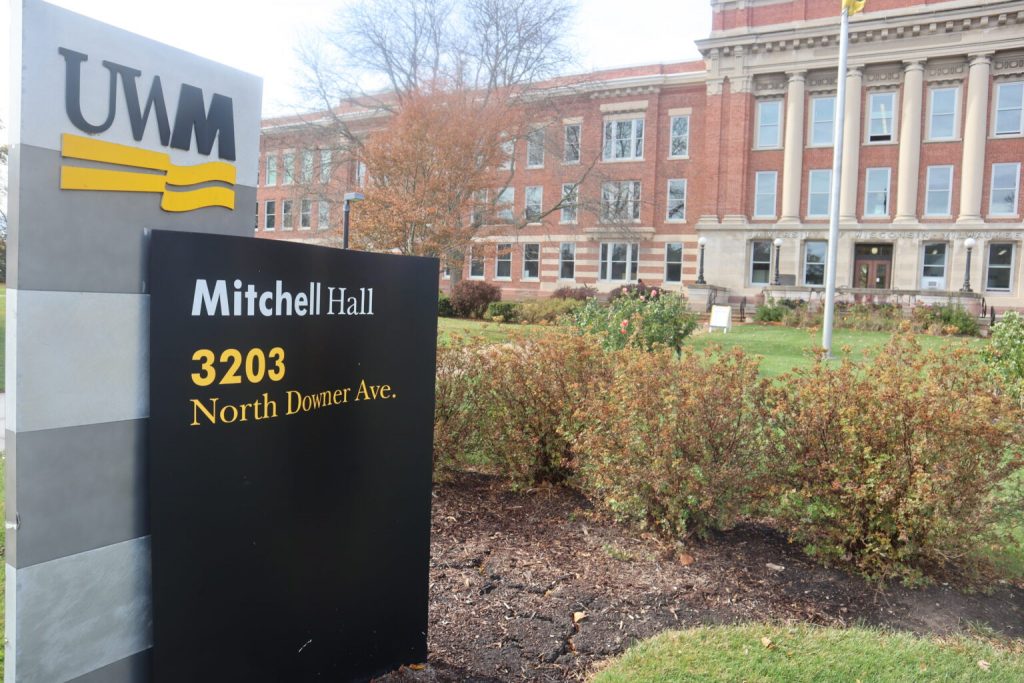Democrats Unveil Statewide Tuition Promise Program
Another bill would reverse Act 10 for most UW system employees.

UW-Milwaukee offers its own tuition promise program which covers up to four years of tuition and segregated fees for students from families earning less than $62,000 per year. (Photo by Isiah Holmes/Wisconsin Examiner)
Democratic lawmakers are proposing a package of higher education bills to help address affordability for students by investing in a statewide cc and to support faculty and staff members by reversing Walker-era collective bargaining and tenure policies.
Rep. Jodi Emerson (D-Eau Claire), the ranking member on the Assembly Colleges and Universities committee, said Democratic lawmakers are looking for ways to ensure Wisconsin’s higher education system is strong and accessible to “anybody who has the talent and the work ethic to want to pursue something.”
“That’s part of our American dream, is that no matter where you start out in life, you’ve got an opportunity to do better and to gain knowledge and training,” Emerson said.
Emerson said Democratic lawmakers hope the bills can kickstart discussions about policy changes that could be made. She noted that Republican lawmakers have often stripped proposals from the budget, saying that policy should be passed through individual bills outside of the budget process.
“We’re putting some of these bills back out now and saying, let’s have the policy discussion,” Emerson said. “If you’re not willing to have that during the budget, let’s have the discussion now.”
Emerson said the first pair of bills that lawmakers unveiled at a press conference last week seek to specifically help with the affordability of higher education.
“A lot of us heard loud and clear last election that pocketbook issues are really what are leading people right now,” Emerson said, adding that it’s part of the reason she supported the recent state budget. “But it wasn’t a perfect budget, and so we thought, how can we make this a little bit better?”
One bill, coauthored by Sen. Kristin Dassler-Alfheim (D-Appleton) and Rep. Brienne Brown (D-Whitewater), would implement a statewide “tuition promise” program, allowing first-time, in-state students from households with an adjusted gross income of $71,000 or less to have their tuition covered at any UW school, other than UW-Madison. Under the bill, the state would dedicate nearly $40 million towards the program.
The program would function as “last-dollar, gap funding” meaning it would fill in the rest of the tuition costs after all federal and state grants and scholarships are calculated.
According to The Hechinger Report , as of 2024, 37 states offered a statewide promise program.
UW-Madison already offers “Bucky’s Tuition Promise,” which launched in 2018 and is funded with private gifts and other institutional resources, not state tax dollars. The program guarantees four years of tuition and segregated fees for any incoming freshman from Wisconsin whose family’s annual household adjusted gross income is $65,000 or less.
Recent studies have found the tuition promise program increased enrollment among accepted students at UW-Madison and increased retention rates.
UW-Milwaukee also offers its own program which covers up to four years of tuition and segregated fees for students from families earning less than $62,000 per year.
The UW system also has a version of the program that recently relaunched in 2025 after the system secured private funding. The Wisconsin Tuition Promise first launched in 2023, but was ended in 2024 after Republican lawmakers declined to fund the program.
Another bill by Dassler-Alfheim and Rep. Angela Stroud (D-Ashland) would invest $10 million in the UW system for student retention and talent development efforts.
At the press conference last week, Dassler-Alfheim said the bills are essential for supporting the state’s workforce.
“If our workforce is the engine that runs our economy, then our Universities of Wisconsin and Wisconsin Technical Colleges are the gasoline that power that engine as our baby boomers retire in droves. We have workforce shortages in every category. We have all struggled to schedule a doctor’s appointment, a plumber, an accountant, or even a cleaning at the dentist,” Dassler-Alfheim said. “The purpose of these two bills is to help qualified students access the higher education needed to advance themselves and to fulfill the promise to Wisconsin employers to develop the workforce necessary to maintain and grow Wisconsin’s economy.”
Democratic lawmakers also circulated bill drafts meant to help support staff and faculty at UW system campuses.
One would again allow most UW system employees, faculty and academic staff to collectively bargain over wages, hours, and conditions of employment. UW employees were stripped of that ability under the Walker-era law Act 10.
Another bill would reverse changes made in the 2015 state budget that eliminated language in state statute that protected tenure. Lawmakers said in 2015 that the changes were necessary to give the UW system flexibility to deal with budget cuts, though faculty members said then that the changes were an attack on tenure.
Emerson said it is getting harder to recruit people to work at the universities in the state and that some of the changes could help.
“If we’re making these big changes about how universities are dealt with, staff and faculty need to have a seat at the table for having these conversations and having a seat at the table in meaningful ways where their concerns are addressed too,” Emerson said.
Emerson noted that in recent years Republican lawmakers have pushed through proposals and deals that triggered pushback from faculty members.
The most recent budget deal negotiated between lawmakers and Gov. Tony Evers included new work load requirements for UW faculty, mandating that they teach a minimum of 24 credits per academic year, or four 3-credit courses, starting in Sept. 2026. The requirement has garnered concerned reactions from faculty, some of who have said it could be difficult to balance teaching and research demands.
In 2023, Republican lawmakers negotiated with UW leaders to secure concessions on diversity, equity and inclusion initiatives in exchange for staff pay raises and money for buildings. The deal garnered a lot of pushback from staff and students at the time.
“You know, the workload requirements that came through the budget, or the DEI deal that happened last session, none of those would have happened if we had collective bargaining in place,” Emerson said. “Those are two things that when you have people who don’t work in an industry trying to put working parameters around that industry, it falls flat.”
Bills likely won’t advance in Republican Legislature
The Democratic proposals will face a difficult road in the Republican-led Legislature. Emerson said the likelihood for a public hearing on the Democratic bills is “slim to none.”
However, Emerson said Democratic lawmakers plan to take the ideas to people in the state other ways. She and some of her Democratic colleagues will be on the UW-Stevens Point campus this week to start a tour of campuses around the state.
Emerson said the purpose is to have as many conversations with staff, faculty and students as possible.
“If we’re not going to have a hearing in Madison on it, we are ready to take this around to other campuses and other parts of the state and have the conversation on the college campuses,” Emerson said. “I want to hear what matters to the students. I want to hear what, you know, the career people need their students to have to get jobs. I want to hear from the business people in these communities.”
Emerson said part of the goal is to also start laying the foundation for if Democrats win more legislative power in 2026.
“It’s always good when you’re making policy about something that you’re talking to the people that this is going to impact, so this is what we’re really hoping to do — work out all the kinks, and dust everything off, and, hopefully, have a little bit more governing power coming up in the next session, and be able to really hit the ground running with some of these bills,” Emerson said.
Emerson said Democratic lawmakers’ approach is focused on figuring out how the state can make higher education available for “anybody no matter their zip code, no matter their income level,” and she expressed skepticism the Republican bills will do that.
“A lot of the bills that I see coming from my Republican colleagues about higher education tend to either be punitive — one person said one thing on one campus, therefore we have to make sure nobody ever says that again and getting into these free speech pieces — or they’re doing things in a way that tells me that they haven’t been on a college campus for a really long time,” Emerson said.
The Senate Universities and Technical Colleges Committee is scheduled to have a public hearing on eight Republican-authored higher education-related bills Wednesday.
One bill, coauthored by Sen. Andre Jacque (R-New Franken) and Rep. Dave Murphy (R-Hortonville), would place caps on annual tuition hikes. It was proposed in reaction to the 5% tuition increase that was approved after the recent state budget was completed. The increase was the third annual hike in a row. UW President Jay Rothman and UW regents had said the tuition increases would be necessary if the system didn’t secure enough funding from the state.
In a memo about the bill, the Republican lawmakers said the Legislature needed to “implement a common sense law placing controls on these types of skyrocketing tuition increases” and that a cap on tuition increases would provide families with “the predictability required to budget for college expenses into the future.” Sen. Julian Bradley (R-New Berlin) has also argued that the bill is about “protecting affordability.”
Under the bill, the UW Board of Regents would be prohibited from increasing undergraduate tuition by more than the consumer price index increase in a given year.
Emerson said she didn’t think the bill would have the intended effect of helping students and families afford school. She noted some of the effects seen during the decade-long tuition freeze implemented under the Walker administration.
UW leaders said at the time that the freeze was unsustainable as it limited campuses ability to maintain its program and course offerings and wages for staff and faculty.
“Students couldn’t get the classes that they needed… so people would sometimes have to go for an extra year to get all of the classes that they needed to complete their degree. It ended up costing people more because they had to stay in longer to get the one last requirement that they needed for their degree,” Emerson said. “It’s a good messaging point to say we’re gonna not increase [tuition] by a certain amount, but I don’t think that that has the end result that they’re thinking it does.”
Wisconsin Democrats propose statewide tuition promise program, higher ed package was originally published by the Wisconsin Examiner.
If you think stories like this are important, become a member of Urban Milwaukee and help support real, independent journalism. Plus you get some cool added benefits.




















